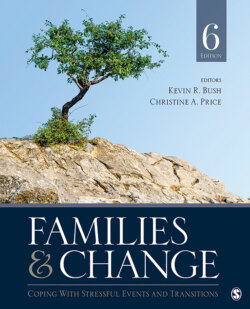Читать книгу Families & Change - Группа авторов - Страница 28
На сайте Литреса книга снята с продажи.
What are Everyday Hassles?
ОглавлениеEveryday hassles are the proximal stressors, strains, and transactions of day-to-day life that can be viewed as common annoyances. These events are relatively minor and arise out of routinized daily activities, such as the tasks involved in maintaining a home, caring for family members, working at a paid job, and participating in community activities (e.g., Serido, Almeida, & Wethington, 2004). Both anticipated and unanticipated events constitute daily hassles (Wheaton, Young, Montazer, & Stuart-Lahman, 2012). For example, commuting to work in morning traffic, chauffeuring children to and from school and activities, and working longer hours at particular times of the year (e.g., holiday season for retailers, tax season for accountants) are all daily hassles that families routinize and anticipate. Unanticipated daily hassles, in contrast, are distinct in their episodic nature. Examples of such hassles include an argument with a spouse, a midday phone call concerning a sick child who needs to be picked up from a childcare center, a flat tire on the way to work, or an unexpected text from a boss demanding attention during nonwork hours. Although many unexpected daily hassles are relatively minor, they often disrupt the flow of everyday life and thus add to family stress.
Whether anticipated or unanticipated, everyday hassles are distinct from other daily stressors that are severe in nature (e.g., microaggressions, discrimination, racism) and the major life events or transitions discussed in other chapters of this book (e.g., death of a loved one, divorce, job loss, immigration). First, everyday hassles represent a more frequent and continuous form of stress than the relatively rare events that constitute major life changes. Because of their frequency, everyday hassles may be more important determinants of family stress than major, but less frequent, life events (Repetti & Wood, 1997b; Serido et al., 2004). Accordingly, the aggregate effects of everyday hassles have the potential to compromise family and individual well-being and even increase vulnerability to major life events. Second, hassles are characterized by relatively minor ongoing stressors that occupy daily living. Although they may contribute to a major life stressor or co-occur with other more toxic forms of daily stress, everyday hassles are viewed as conceptually distinct from other forms of daily stress (Serido et al., 2004). These conceptually distinct forms of stress may interact; families experiencing major life changes also confront daily hassles and continuous toxic stressors. For example, a family member who is adjusting to a major life event, such as immigration to the United States, may feel heightened stress if they miss an appointment or has to pick up a sick child from school. The stress from a relatively minor everyday hassle is likely to be heightened for a recent immigrant who may also be exposed to more severe chronic stressors related to English competency, legal status, or discriminatory practices at work.
